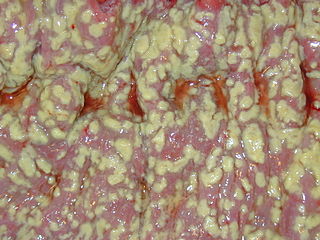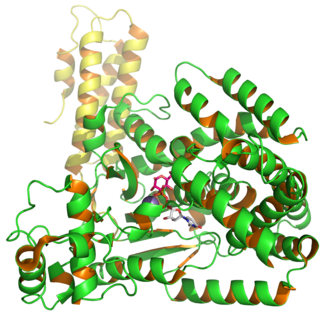Related Research Articles

Clostridioides difficile infection, also known as Clostridium difficile infection, is a symptomatic infection due to the spore-forming bacterium Clostridioides difficile. Symptoms include watery diarrhea, fever, nausea, and abdominal pain. It makes up about 20% of cases of antibiotic-associated diarrhea. Antibiotics can contribute to detrimental changes in gut microbiota; specifically, they decrease short-chain fatty acid absorption which results in osmotic, or watery, diarrhea. Complications may include pseudomembranous colitis, toxic megacolon, perforation of the colon, and sepsis.

Clostridium perfringens is a Gram-positive, bacillus (rod-shaped), anaerobic, spore-forming pathogenic bacterium of the genus Clostridium. C. perfringens is ever-present in nature and can be found as a normal component of decaying vegetation, marine sediment, the intestinal tract of humans and other vertebrates, insects, and soil. It has the shortest reported generation time of any organism at 6.3 minutes in thioglycolate medium.
The UMass Chan Medical School is a public medical school in Worcester, Massachusetts. It is part of the University of Massachusetts system. It consists of three schools: the T.H. Chan School of Medicine, the Morningside Graduate School of Biomedical Sciences, and the Tan Chingfen Graduate School of Nursing. The school also operates a biomedical research enterprise and a range of public-service initiatives throughout the state.

The Clostridia are a highly polyphyletic class of Bacillota, including Clostridium and other similar genera. They are distinguished from the Bacilli by lacking aerobic respiration. They are obligate anaerobes and oxygen is toxic to them. Species of the class Clostridia are often but not always Gram-positive and have the ability to form spores. Studies show they are not a monophyletic group, and their relationships are not entirely certain. Currently, most are placed in a single order called Clostridiales, but this is not a natural group and is likely to be redefined in the future.

Fecal microbiota transplant (FMT), also known as a stool transplant, is the process of transferring fecal bacteria and other microbes from a healthy individual into another individual. FMT is an effective treatment for Clostridioides difficile infection (CDI). For recurrent CDI, FMT is more effective than vancomycin alone, and may improve the outcome after the first index infection.

Antibody-dependent cellular cytotoxicity (ADCC), also referred to as antibody-dependent cell-mediated cytotoxicity, is a mechanism of cell-mediated immune defense whereby an effector cell of the immune system kills a target cell, whose membrane-surface antigens have been bound by specific antibodies. It is one of the mechanisms through which antibodies, as part of the humoral immune response, can act to limit and contain infection.
Medarex was an American biopharmaceutical company based in Princeton, New Jersey, with manufacturing facilities in Bloomsbury and Annandale, New Jersey, and research facilities in Milpitas and Sunnyvale, California. In 2009, Medarex was purchased by Bristol Myers Squibb.

Clostridioides difficile toxin B (TcdB) is a cytotoxin produced by the bacteria Clostridioides difficile. It is one of two major kinds of toxins produced by C. difficile, the other being a related enterotoxin. Both are very potent and lethal.

Clostridioides difficile toxin A (TcdA) is a toxin produced by the bacteria Clostridioides difficile, formerly known as Clostridium difficile. It is similar to Clostridium difficile Toxin B. The toxins are the main virulence factors produced by the gram positive, anaerobic, Clostridioides difficile bacteria. The toxins function by damaging the intestinal mucosa and cause the symptoms of C. difficile infection, including pseudomembranous colitis.
Clostridium novyi (oedematiens) a Gram-positive, endospore- forming, obligate anaerobic bacteria of the class Clostridia. It is ubiquitous, being found in the soil and faeces. It is pathogenic, causing a wide variety of diseases in humans and animals.

Fidaxomicin, sold under the brand name Dificid among others, is the first member of a class of narrow spectrum macrocyclic antibiotic drugs called tiacumicins. It is a fermentation product obtained from the actinomycete Dactylosporangium aurantiacum subspecies hamdenesis. Fidaxomicin is minimally absorbed into the bloodstream when taken orally, is bactericidal, and selectively eradicates pathogenic Clostridioides difficile with relatively little disruption to the multiple species of bacteria that make up the normal, healthy intestinal microbiota. The maintenance of normal physiological conditions in the colon may reduce the probability of recurrence of Clostridioides difficile infection.
Colitis X, equine colitis X or peracute toxemic colitis is a catchall term for various fatal forms of acute or peracute colitis found in horses, but particularly a fulminant colitis where clinical signs include sudden onset of severe diarrhea, abdominal pain, shock, and dehydration. Death is common, with 90–100% mortality, usually in less than 24 hours. The causative factor may be Clostridioides difficile, but it also may be caused by other intestinal pathogens. Horses under stress appear to be more susceptible to developing colitis X, and like the condition pseudomembranous colitis in humans, an association with prior antibiotic use also exists. Immediate and aggressive treatment can sometimes save the horse, but even in such cases, 75% mortality is considered a best-case scenario.
Bezlotoxumab, sold under the brand name Zinplava, is a human monoclonal antibody designed for the prevention of recurrence of Clostridioides difficile infections. Bezlotoxumab binds to Clostridioides difficile toxin B.
Tildrakizumab, sold under the brand name Ilumya among others, is a monoclonal antibody designed for the treatment of immunologically mediated inflammatory disorders. It is approved for the treatment of adults with moderate-to-severe plaque psoriasis in the United States and in the European Union.

Cadazolid is an experimental antibiotic of the oxazolidinone class made by Actelion Pharmaceuticals Ltd. which is effective against Clostridium difficile, a major cause of drug resistant diarrhea in the elderly. Current drug treatments for this infection involve orally delivered antibiotics, principally fidaxomicin, metronidazole and vancomycin; the last two drugs are the principal therapeutic agents in use, but fail in approximately 20 to 45% of the cases. The drug works by inhibiting synthesis of proteins in the bacteria, thus inhibiting the production of toxins and the formation of spores. Cadazolid progressed through to Phase III clinical trials, but in its financial results for Q1 2018, Idorsia mentions that Actelion informed them that "following completion of Phase 3 data analysis of cadazolid - it has decided to discontinue the development of the compound."

Clostridioides difficile is a bacterium known for causing serious diarrheal infections, and may also cause colon cancer. It is known also as C. difficile, or C. diff, and is a Gram-positive species of spore-forming bacteria. Clostridioides spp. are anaerobic, motile bacteria, ubiquitous in nature and especially prevalent in soil. Its vegetative cells are rod-shaped, pleomorphic, and occur in pairs or short chains. Under the microscope, they appear as long, irregular cells with a bulge at their terminal ends. Under Gram staining, C. difficile cells are Gram-positive and show optimum growth on blood agar at human body temperatures in the absence of oxygen. C. difficile is catalase- and superoxide dismutase-negative, and produces up to three types of toxins: enterotoxin A, cytotoxin B and Clostridioides difficile transferase. Under stress conditions, the bacteria produce spores that are able to tolerate extreme conditions that the active bacteria cannot tolerate.

Ridinilazole is an investigational small molecule antibiotic being evaluated for oral administration to treat Clostridioides difficile infection (CDI). In vitro, it is bactericidal against C. difficile and suppresses bacterial toxin production; the mechanism of action is thought to involve inhibition of cell division. It has properties which are desirable for the treatment of CDI, namely that it is a narrow-spectrum antibiotic which exhibits activity against C. difficile while having little impact on other normal intestinal flora and that it is only minimally absorbed systemically after oral administration. At the time ridinilazole was developed, there were only three antibiotics in use for treating CDI: vancomycin, fidaxomicin, and metronidazole. The recurrence rate of CDI is high, which has spurred research into other treatment options with the aim to reduce the rate of recurrence.
John Gill Bartlett was an American physician and medical researcher, specializing in infectious diseases. He is known as a pioneer in HIV/AIDS research and for his work on vancomycin as a treatment for Clostridioides difficile infection.
Oligoclonal antibodies are an emerging immunological treatment relying on the combinatory use of several monoclonal antibodies (mAb) in one single drug. The composition can be made of mAb targeting different epitopes of a same protein (homo-combination) or mAb targeting different proteins (hetero-combination). It mimicks the natural polyclonal humoral immunological response to get better efficiency of the treatment. This strategy is most efficient in infections and in cancer treatment as it allow to overcome acquired resistance by pathogens and the plasticity of cancers.
Fecal microbiota, sold under the brand name, Rebyota is used for the prevention of recurrence of Clostridioides difficile infection.
References
- ↑ "Statement On A Nonproprietary Name Adopted By The USAN Council - Actoxumab" (PDF). American Medical Association.
- ↑ Lowy I, Molrine DC, Leav BA, Blair BM, Baxter R, Gerding DN, Nichol G, Thomas WD, Leney M, Sloan S, Hay CA, Ambrosino DM (January 2010). "Treatment with monoclonal antibodies against Clostridium difficile toxins". N. Engl. J. Med. 362 (3): 197–205. doi: 10.1056/NEJMoa0907635 . PMID 20089970.
- ↑ "Merck & Co., Inc., Medarex, Inc. and Massachusetts Biologic Laboratories Sign Exclusive Licensing Agreement for Investigational Monoclonal Antibody Combination for Clostridium Difficile Infection". Press Release. Merck Sharp & Dohme Corp.
- ↑ New treatment for C.diff infections reduces recurrences by 40%, study finds